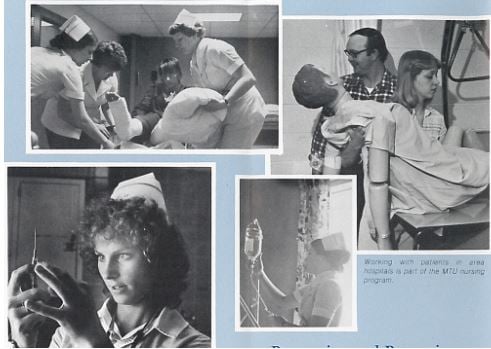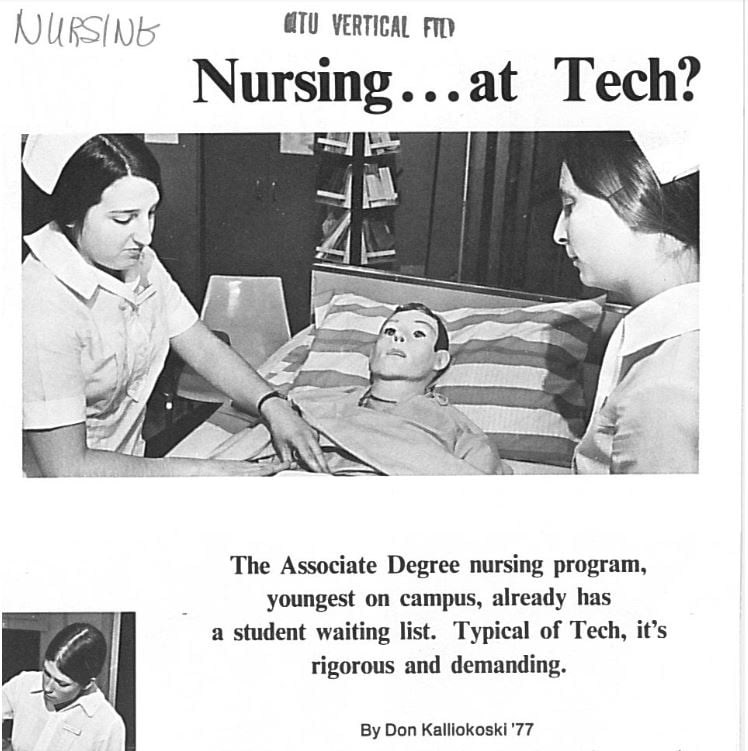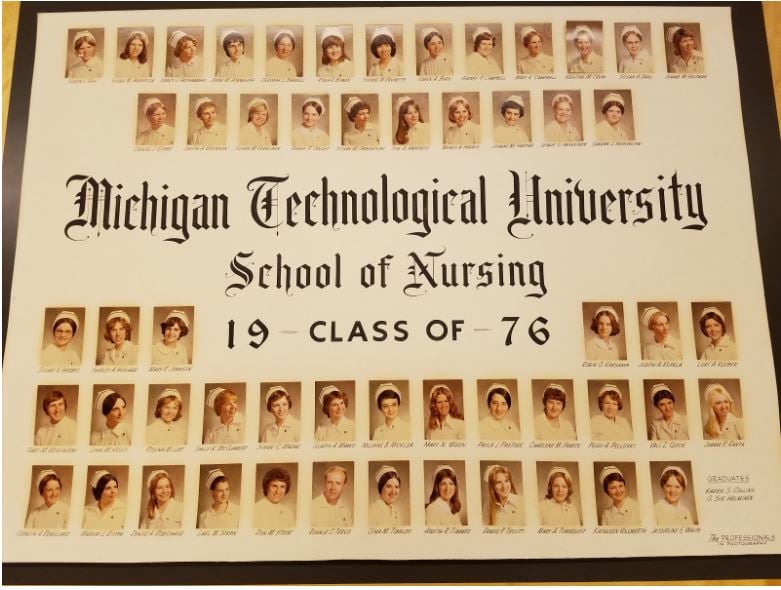
Michigan Tech has long been recognized for the excellence of its programs across the board. From biochemistry to forestry to mining, it’s hard to find a field where Huskies haven’t opened up new opportunities and excelled as Crazy Smart professionals.
Many Tech students, however, don’t wait until after they graduate to start blazing trails. Between 1973 and 1982, a group of students–the majority of them women–paved the way for a new brand of nursing education in the Copper Country and laid the groundwork for several top-notch programs in health sciences and medical technology that serve Huskies today. Those who have majored in kinesiology, biomedical engineering, medical laboratory science, and other health and pre-health programs owe a debt of gratitude to the nurses of Michigan Tech.
From the early 1900s on, nursing education in the Copper Country had generally taken place in hospital settings. St. Joseph’s Hospital (later Portage View/UP Health System Portage) in Hancock established its own school of nursing in 1920 and trained 700 nurses over the course of fifty years. Teachers came from the hospital’s staff, the Sisters of St. Joseph of Carondelet. The Catholic Church’s Second Vatican Council in the mid-1960s marked the beginning of difficult times for many religious orders, however, and in the years that followed the Sisters of St. Joseph began to turn the operation of the hospital over to the local community. As part of the transition, the nursing school would be shuttered; the class of 1974 would be the last to graduate.
The western Upper Peninsula still desired a place to educate its nurses close to home, though, and Michigan Tech stepped up to take the place of St. Joseph’s. It was a logical decision: the hospital’s nursing school had begun to hold some non-clinical classes on the Tech campus in 1965 and to enroll its students in university science courses. By 1972, a St. Joseph’s nursing student could receive a certain amount of financial aid from Tech, reside in its dormitories, and earn 31 hours of credit at the university over the course of a twenty-month diploma program. Michigan Tech proposed to construct an associate degree program in the School of Technology that would conform to university standards and meet state requirements for nursing education. The program was formally announced in August 1973, and students enrolled in pre-nursing science courses in the fall quarter. Nursing classes began the following spring, and the first students graduated with Michigan Tech nursing degrees in June 1975.

What were the experiences of these students like? Most enrollees were women, mirroring the demographics of other American nursing programs at the time; an article written in 1976 noted that 114 of the current 120 students were female. They were an elite group: the program had almost immediately attracted enough interest to form a waiting list, and only those who could meet Michigan Tech’s stringent admissions requirements were accepted. The nursing degree imposed an additional condition that reflected the unique demands of nursing: good physical and stable emotional health. Instructors were highly experienced nurses who emphasized strong relationships with their students, creating an effective learning environment. More than 80 percent of students enrolled in those first years graduated; the national average for nursing programs at that time was 70 percent.
The high graduation rate, however, should not be understood as a sign that the program was easy. Courses and clinical work pushed and challenged aspiring nurses. In their first two quarters at Tech, nursing students studied human biology, microbiology, psychology, and sociology, as well as English composition and political science. Nursing coursework, which began in the third quarter, addressed such topics as the health impacts of acute stress, caring for those with long-term illnesses, and providing care to populations with varied needs and health considerations.
Clinical experience and field trips, so vital to any nurse in training, naturally played a significant part in a Michigan Tech education, as well. Nursing students ventured both into the local community and further afield for their practical experience. Calumet Public Hospital in Laurium hosted students for clinicals, as did Portage View Hospital and Houghton County Medical Care, a long-term facility, in Hancock. At this time, the storied Newberry State Hospital–renamed the Newberry Regional Psychiatric Hospital in 1977–was still in operation, and students made the trek across the peninsula to see how medical staff there cared for individuals facing mental health challenges. A second field trip took them to Bay Cliff Health Camp near Marquette, where children with physical disabilities could have fun and receive therapy.

As at the nursing school at St. Joseph’s, and as it had been hoped, students graduating from Michigan Tech’s nursing program often chose to serve the local community. In 1980, about half of all Tech nursing alums remained in the Upper Peninsula, and approximately one-third worked in the western region. Many returned to the sites of their clinicals to find a job: that same year, nurses educated by either Tech’s program or its predecessor at St. Joseph’s constituted 90 percent of the nursing staff at Houghton County Medical Care, 60 percent at Portage View Hospital, and 57 percent at Calumet Public Hospital. At Baraga County Memorial Hospital in L’Anse, 58 percent of the staff claimed Tech or St. Joseph’s as alma mater.
While the nursing program at Michigan Tech ended with the class of 1982, its influences continue. Graduates, who number a little over 300 in total, continue to faithfully care for patients in hospitals across Michigan and throughout the country, earning professional accolades and successfully pursuing further education in their chosen field. Meanwhile, majors allowing Huskies to contribute to the ever-changing field of health professions continue to flourish: biological sciences, kinesiology, bioinformatics, and other programs remain popular, groundbreaking choices on campus today.
Hooray to the writer for putting forth a great MTU Nurses article
Glad to see they have not been forgotten!!
I married one and she is great.
Thank you for the wonderful memories of the nursing program at MTU. I had no idea back then all that nursing is or would be. It is an incredible profession that I feel honored to be part of. I wish my fellow nurses a very happy and well deserved celebration of Nurses’ Week.